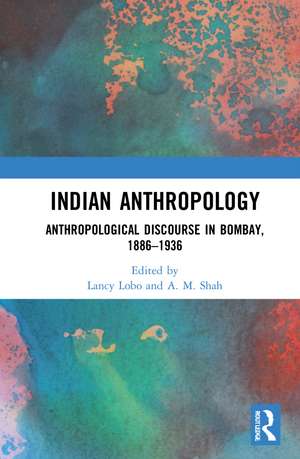Indian Anthropology: Anthropological Discourse in Bombay, 1886–1936
Editat de Lancy Lobo, A.M. Shahen Limba Engleză Paperback – 25 sep 2023
This volume is divided into three parts: Part I deals with the six contributions on the history of the development of anthropology in India; Part II deals with four contributions on the methodology and collecting ethnographic data; and Part III deals with four contributions on theoretical analysis of ethnographic facts. The roots of many contemporary conflicts and social issues can be traced to this formative period of anthropology in India.
This book will be useful to students and researchers of anthropology, sociology, public administration, modern history, and demography. It will also be of interest to civil servants, students of history, Indian culture and society, religions, colonial history, law, and South Asia studies.
| Toate formatele și edițiile | Preț | Express |
|---|---|---|
| Paperback (1) | 381.21 lei 6-8 săpt. | |
| Taylor & Francis – 25 sep 2023 | 381.21 lei 6-8 săpt. | |
| Hardback (1) | 998.40 lei 6-8 săpt. | |
| Taylor & Francis – 30 sep 2021 | 998.40 lei 6-8 săpt. |
Preț: 381.21 lei
Nou
Puncte Express: 572
Preț estimativ în valută:
72.94€ • 76.16$ • 60.37£
72.94€ • 76.16$ • 60.37£
Carte tipărită la comandă
Livrare economică 04-18 aprilie
Preluare comenzi: 021 569.72.76
Specificații
ISBN-13: 9781032113685
ISBN-10: 1032113685
Pagini: 172
Ilustrații: 6 Tables, black and white; 3 Halftones, black and white; 3 Illustrations, black and white
Dimensiuni: 156 x 234 x 9 mm
Greutate: 0.25 kg
Ediția:1
Editura: Taylor & Francis
Colecția Routledge India
Locul publicării:Oxford, United Kingdom
ISBN-10: 1032113685
Pagini: 172
Ilustrații: 6 Tables, black and white; 3 Halftones, black and white; 3 Illustrations, black and white
Dimensiuni: 156 x 234 x 9 mm
Greutate: 0.25 kg
Ediția:1
Editura: Taylor & Francis
Colecția Routledge India
Locul publicării:Oxford, United Kingdom
Public țintă
PostgraduateCuprins
Introduction. Inauguration of the Anthropological Society of Bombay, 1886: A Vision for Anthropology in India Part I: History of the Development of Anthropology in India 1. Anthropology in India 2. Progress of the Study of Indian Anthropology in Europe, and Cognate Matters 3. Development or Evolution of Anthropology in India 4. Study of Anthropology in India 5. The Study of Anthropology in the West 6. The Retrospect and the Prospect of the Work of the Anthropological Society of Bombay Part II: Methodology and Collecting Ethnographic Data 7. Importance of Collecting Facts (Presidential Address) 8. Collecting Diverse Social and Cultural Facts (Presidential Address, 1906) 9. The Study of Ethnography in the Bombay Presidency 10. The Ethnographical Survey of India Part III: Theoretical Analysis of Ethnographic Facts 11. Totem Theories 12. Is the Retention of the Term Animism in Census Justified? 13. The Superstition of Concealing One’s Proper Age as Shown by the Indian Census Statistics 14. Interpreting a Government House Reception from a Cultural Anthropology Perspective
Notă biografică
Lancy Lobo is currently the Director, Centre for Culture and Development, Vadodara, India. He has earlier served as the Director, Centre for Social Studies, Surat. He has conducted extensive studies on dalits, tribals, OBCs and minorities in rural and urban Gujarat. He has authored, co-authored and edited twenty-two books.
A.M. Shah is former Professor of Sociology at the Delhi School of Economics, University of Delhi, India. He has been felicitated with the Lifetime Achievement Award by the Indian Sociological Society, the Swami Pranavananda Award by the University Grants Commission, a National Fellowship by the Indian Council of Social Science Research, and the Distinguished Service Award by the University of Delhi. He has been a Visiting Fellow at several universities and institutes in India and abroad and has authored and edited many books on a variety of subjects. His books and papers on household and family in India are collected in an omnibus (Delhi, 2006).
A.M. Shah is former Professor of Sociology at the Delhi School of Economics, University of Delhi, India. He has been felicitated with the Lifetime Achievement Award by the Indian Sociological Society, the Swami Pranavananda Award by the University Grants Commission, a National Fellowship by the Indian Council of Social Science Research, and the Distinguished Service Award by the University of Delhi. He has been a Visiting Fellow at several universities and institutes in India and abroad and has authored and edited many books on a variety of subjects. His books and papers on household and family in India are collected in an omnibus (Delhi, 2006).
Descriere
Indian Anthropology is an important contribution to the history of Indian anthropology, focusing on its formative period. It looks at the political economy of knowledge production and the anthropological discourse in Bombay during the late nineteenth century.
